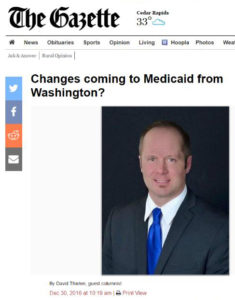The Arc Applauds U.S. Supreme Court Decision in Special Education Case: “The IDEA Demands More”
By: Shira Wakschlag, Director of Legal Advocacy & Associate General Counsel
On Wednesday, in the second major win for students with disabilities and their families before the U.S. Supreme Court this term, the Court issued a unanimous decision in the special education case Endrew F. v. Douglas County School District RE-1. In an opinion authored by Chief Justice John Roberts, the Court clarified the test for determining whether school districts have met their obligation to provide a free appropriate public education (FAPE) to students with disabilities, definitively rejecting the incredibly low standard utilized by the Tenth Circuit in this case. Specifically, the Court held that:
To meet its substantive obligation under the IDEA, a school must offer an IEP reasonably calculated to enable a child to make progress appropriate in light of the child’s circumstances…After all, the essential function of an IEP is to set out a plan for pursuing academic and functional advancement…A substantive standard not focused on student progress would do little to remedy the pervasive and tragic academic stagnation that prompted Congress to act.
Significantly, this is the first time the Court has articulated a specific standard of review for educational benefit required for schools to meet their FAPE obligations under the IDEA. In 1982, the Court held in Board of Education of Hendrick Hudson Central School District v. Rowley that the IDEA establishes a substantive right to FAPE for children with disabilities but declined to establish a specific standard for determining when children with disabilities are receiving sufficient educational benefits to satisfy the IDEA. Lower courts have thus interpreted this substantive right in a variety of ways, some applying an incredibly low standard of review as the Tenth Circuit did in this case, while others have established a higher bar and called for a “meaningful benefit” standard.
Here, Drew, a child with autism, was removed from public school in fourth grade by his parents when his behavior began deteriorating and he ceased making academic progress. His IEP repeated the same basic goals from year to year, indicating a lack of progress toward the IEP goals. His parents believed a dramatic change to the IEP was necessary, but the school district continued to present the same IEP without any meaningful changes. Accordingly, Drew’s parents put him in a private school that specialized in educating students with autism and developed a behavioral intervention plan as well as more meaningful and robust academic goals. As a result, Drew began making dramatic progress. Drew’s parents then met again with the school district who presented them with a new IEP that did not incorporate any goals or approaches that would match the level of services he was receiving at the private school.
His parents filed a complaint with the Colorado Department of Education seeking tuition reimbursement for Drew’s private school due to the school district’s failure to provide him with a FAPE since his final IEP was not “reasonably calculated to enable him to receive educational benefits.” The Administrative Law Judge disagreed and the district court and Tenth Circuit affirmed. Citing Rowley and prior Tenth Circuit precedent, the panel noted that it had long interpreted Rowley’s “some educational benefit” requirement to mean that an IEP was adequate as long as it was calculated to confer an educational benefit that is “merely more than de minimis.” “De minimis” is a Latin phrase meaning “so minor as to merit disregard.”
As noted above, the Supreme Court unequivocally rejected this bare bones approach to evaluating educational benefit and articulated a new, higher standard. The Court explained that when a child with a disability is integrated into the regular classroom, the IDEA typically requires providing a level of instruction that is reasonably calculated to permit advancement through the general curriculum. Where that is not a reasonable expectation, this does not mean that the IEP should be stripped of substantive and meaningful standards. Rather, the IEP:
must be appropriately ambitious in light of [the student’s] circumstances, just as advancement from grade to grade is appropriately ambitious for most children in the regular classroom. The goals may differ, but every child should have the chance to meet challenging objectives. (Emphasis added.)
It is important to note that this decision overturns a standard utilized by Judge Neil Gorsuch who just completed his confirmation hearing before the Senate Judiciary Committee following his nomination to the Supreme Court. Last week, The Arc published a review of Judge Gorsuch’s record on disability rights and highlighted his decision in Thompson R2-JSchool District v. Luke P. in which he employed the merely more than de minimis standard that was later used by the Tenth Circuit in the present case. Dr. Jeffrey Perkins, Luke’s father, testified before the Judiciary Committee on Thursday, noting that Judge Gorsuch’s articulated standard for an educational benefit that is “just above meaningless” was “devastating” to the family and “threatened” Luke’s “access to an appropriate education and thus to a meaningful and dignified life.” As Dr. Perkins explained:
Luke will always need support in a world that still seems perplexing and threatening to him. But his quality of life after 13 years of appropriate education is vastly better than it would have been otherwise. He cooks and does household chores. He is able to shop, work, eat and play in the community…His present life would not have been achievable without an appropriate education.
In his 10th Circuit ruling, Judge Gorsuch eviscerated the educational standard guaranteed by the IDEA…Legal philosophy and case law aside, such an interpretation clearly fails the common sense test. Why would Congress pass a law with such a trivial intent?
The Arc, as part of a large coalition of disability advocacy groups, participated in an amicus brief in support of Drew in November and attended oral arguments before the Court in January. While the standard articulated by the Court is not a detailed formula that specifically defines what appropriate progress will look like from case to case, it is unquestionably more demanding than the standard laid out by Judge Gorsuch and various other circuit court judges. In a time when the ability of people with disabilities to live in the community is under threat, the Court’s unequivocal statement that the “IDEA demands more” is a major victory for students with disabilities and their families that should be celebrated.


 David Thielen, CEO of The Arc of East Central Iowa, had a
David Thielen, CEO of The Arc of East Central Iowa, had a  Heather Denman, Executive Director of The Arc of Harrison and Rockingham, appeared in a
Heather Denman, Executive Director of The Arc of Harrison and Rockingham, appeared in a 





